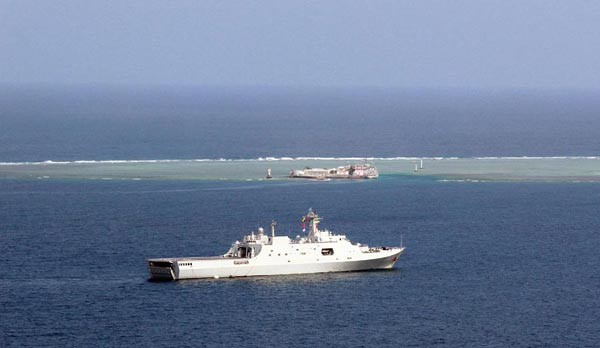 |
|
A formation of the Nanhai Fleet of China's Navy on Saturday finished a three-day patrol of the Nansha islands in the South China Sea. [Photo/Xinhua] |
The John C. Stennis Carrier Strike Group, which includes five US naval vessels, made a high-profile appearance in the South China Sea a few days ago, angering many in China. When I asked Mark Toner, State Department deputy spokesman, on Monday whether such a move was raising tensions in the Asia-Pacific region, he repeated his government's talk of the US exercising freedom of navigation rights. The US will continue to do so in accordance with international law, he added.
Common sense tells us that everything which is not forbidden is allowed. Let's assume for a moment the five-day show of the John C. Stennis Carrier Strike Group in the South China Sea was in accordance with international law. Still, it does not mean it did not escalate tensions there.
Also, it is absolutely legal for a passerby to stand and look into your house. But it will make you feel uneasy, even angry, if he/she keeps doing it every day. And he/she will drive you crazy by standing on the sidewalk outside your house for hours with a Swiss army knife in hand.
To a large extent this is what the John C. Stennis strike group did a few days ago, USS Curtis Wilbur did in January and USS Lassen did in October last year in the South China Sea. In fact, US military planes and ships have been conducting annoying surveillance operations near China's coasts for long.
That the US is in talks to base long-range bombers in Australia within striking distance of the South China Sea is the latest disturbing news raising questions about Washington's intentions. Chinese Foreign Minister Wang Yi said it well at a news conference this week: freedom of navigation does not give anyone the license to do whatever they want.
US actions are certainly militarizing the South China Sea and heightening tensions in the region. "Do unto others as you would have them do unto you", a Confucian saying used in US war propaganda documentaries during World War II to describe the good nature of Chinese, is largely forgotten by today's US leaders.
If you think there is too much China-bashing already in the US, imagine what will happen if People's Liberation Army planes fly and ships sail frequently off the coasts of California, Florida and New York, or when China starts building military bases in Latin America and holds military drills in the Caribbean Sea.
With a defense budget larger than that of the next eight countries put together, a nuclear arsenal that could destroy the planet many times over and more than 800 military bases across the world, including 113 in Japan and 83 in the Republic of Korea, the US military is indeed unrivalled.
Yet among the complaints I hear in Washington is one that US politicians are easily tempted to use military solutions because of the country's strategic might. This was echoed at a talk given by Gregory Treverton, chairman of the National Intelligence Council, on March 4. When asked about the mess in Libya and other places as a result of US military actions, Treverton admitted that the US is better at carrying out military operations than caring about the results it wants to achieve.
What it entails is that when US leaders and politicians keep boasting and advocating military superiority, they do not realize their country's military power has proved to be a blessing as much as a curse. No wonder the US has been continuously engaged in wars.
Apparently, such a mindset has also prevented many US leaders and politicians to think straight when it comes to the South China Sea.
The author is deputy editor of China Daily USA. [email protected]

I’ve lived in China for quite a considerable time including my graduate school years, travelled and worked in a few cities and still choose my destination taking into consideration the density of smog or PM2.5 particulate matter in the region.
